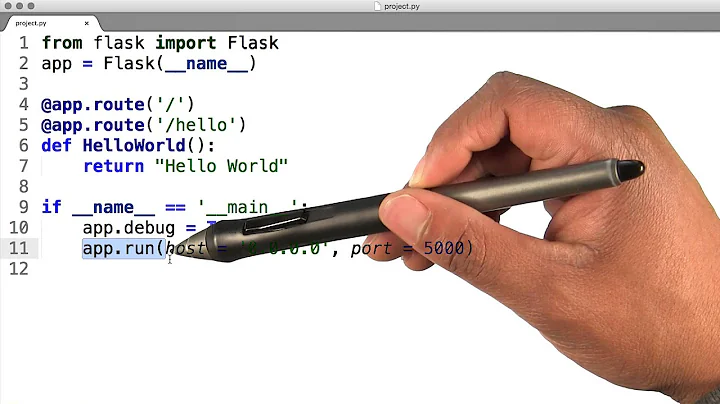How to print from Flask @app.route to python console
Solution 1
An easy way to do this is by printing to stderr. You can do that like this:
from __future__ import print_function # In python 2.7
import sys
@app.route('/button/')
def button_clicked():
print('Hello world!', file=sys.stderr)
return redirect('/')
Flask will display things printed to stderr in the console. For other ways of printing to stderr, see this stackoverflow post
Solution 2
We can also use logging to print data on the console.
Example:
import logging
from flask import Flask
app = Flask(__name__)
@app.route('/print')
def printMsg():
app.logger.warning('testing warning log')
app.logger.error('testing error log')
app.logger.info('testing info log')
return "Check your console"
if __name__ == '__main__':
app.run(debug=True)
Solution 3
I think the core issue with Flask is that stdout gets buffered. I was able to print with print('Hi', flush=True). You can also disable buffering by setting the PYTHONUNBUFFERED environment variable (to any non-empty string).
Solution 4
I tried running @Viraj Wadate's code, but couldn't get the output from app.logger.info on the console.
To get INFO, WARNING, and ERROR messages in the console, the dictConfig object can be used to create logging configuration for all logs (source):
from logging.config import dictConfig
from flask import Flask
dictConfig({
'version': 1,
'formatters': {'default': {
'format': '[%(asctime)s] %(levelname)s in %(module)s: %(message)s',
}},
'handlers': {'wsgi': {
'class': 'logging.StreamHandler',
'stream': 'ext://flask.logging.wsgi_errors_stream',
'formatter': 'default'
}},
'root': {
'level': 'INFO',
'handlers': ['wsgi']
}
})
app = Flask(__name__)
@app.route('/')
def index():
return "Hello from Flask's test environment"
@app.route('/print')
def printMsg():
app.logger.warning('testing warning log')
app.logger.error('testing error log')
app.logger.info('testing info log')
return "Check your console"
if __name__ == '__main__':
app.run(debug=True)
Related videos on Youtube
Robert Filter
If you like electrodynamic problems with solutions and their connections to current research, please visit photonics101.com
Updated on July 16, 2021Comments
-
 Robert Filter almost 2 years
Robert Filter almost 2 yearsI would like to simply print a "hello world" to the python console after /button is called by the user.
This is my naive approach:
@app.route('/button/') def button_clicked(): print 'Hello world!' return redirect('/')Background: I would like to execute other python commands from flask (not shell). "print" should be the easiest case. I believe I have not understood a basic twist here. Thanks in advance!
-
 Daniel Roseman over 7 yearsYou're confusing two things here. You can call any functions you like from a handler; but the issue with print is what Flask is doing to stdout.
Daniel Roseman over 7 yearsYou're confusing two things here. You can call any functions you like from a handler; but the issue with print is what Flask is doing to stdout. -
 Robert Filter over 7 yearsHi @DanielRoseman and thanks for the comment! So flask is somewhat routing the print to http? What should I do to prevent this? Sorry if the question is silly :)
Robert Filter over 7 yearsHi @DanielRoseman and thanks for the comment! So flask is somewhat routing the print to http? What should I do to prevent this? Sorry if the question is silly :) -
 Ciaran Liedeman over 7 yearsThere are no silly questions :)
Ciaran Liedeman over 7 yearsThere are no silly questions :) -
 dirn over 7 yearsFlask does not route
dirn over 7 yearsFlask does not routeprintto the response. If you are running the development server from a terminal session, you will see the output there. If you are running it through a WSGI server such as uWSGI, the output will appear in the logs instead. -
 Ciaran Liedeman over 7 yearsHow are you starting flask?
Ciaran Liedeman over 7 yearsHow are you starting flask? -
 Robert Filter over 7 yearsHi @ciaran, i am starting the script from pyscripter. This should be equivalent to python myscript.py
Robert Filter over 7 yearsHi @ciaran, i am starting the script from pyscripter. This should be equivalent to python myscript.py -
 Robert Filter over 7 yearsJust to add that all have been right. Print is simply not meant here to provide output in the console.
Robert Filter over 7 yearsJust to add that all have been right. Print is simply not meant here to provide output in the console. -
 Austin Pray over 4 yearsMight be worth checking this out: gitlab.com/meltano/meltano/issues/106#note_105372174
Austin Pray over 4 yearsMight be worth checking this out: gitlab.com/meltano/meltano/issues/106#note_105372174
-
-
 Robert Filter over 7 yearsThx @Gabe, this seems to be a way to go.
Robert Filter over 7 yearsThx @Gabe, this seems to be a way to go. -
 e271p314 almost 6 yearsDo I really need to go over all files and add
e271p314 almost 6 yearsDo I really need to go over all files and addfrom __future__ import print_functionalsofile=sys.stderrfor every print? is there a short way to it? -
 Gabe almost 6 yearsI would recommend taking a look at the post I linked to in the original answer. There's one person recommends defining a function which always prints to stderr (you could put this in a util file that you already import). Another person recommends sys.stderr.write.
Gabe almost 6 yearsI would recommend taking a look at the post I linked to in the original answer. There's one person recommends defining a function which always prints to stderr (you could put this in a util file that you already import). Another person recommends sys.stderr.write. -
 phoenix over 4 yearsYou could also save a little bit of repetition with:
phoenix over 4 yearsYou could also save a little bit of repetition with:from sys import stderr,file=stderr. In Python 3+, you don't needfrom __future__ import print_function, that is the default functionality. -
 jcroll about 4 yearsIf dumping an object this seems to work
jcroll about 4 yearsIf dumping an object this seems to workpprint(vars(myobject), sys.stderr) -
 gunslingor over 3 yearsSee this if you cannot get the info logger to work: flask.palletsprojects.com/en/1.0.x/logging
gunslingor over 3 yearsSee this if you cannot get the info logger to work: flask.palletsprojects.com/en/1.0.x/logging -
 learner0000 about 3 yearsThis is the best way for print-debugging, especially in small projects
learner0000 about 3 yearsThis is the best way for print-debugging, especially in small projects -
 thanos.a about 3 yearsWhat is the value that should be set in the PYTHONUNBUFFERED env variable ?
thanos.a about 3 yearsWhat is the value that should be set in the PYTHONUNBUFFERED env variable ? -
 Chris about 3 years@thanos.a You can set it to any non-empty string. I updated the answer.
Chris about 3 years@thanos.a You can set it to any non-empty string. I updated the answer. -
 thanos.a about 3 yearsYou can add an example like PYTHONUNBUFFERED="anything_here"
thanos.a about 3 yearsYou can add an example like PYTHONUNBUFFERED="anything_here" -
 Anonymous12332313 almost 2 yearsI'm using flask run to run the app from command prompt. I'm using pycharm as my IDE. In run configurations I have it set to emulate terminal in output console. When I try this, nothing prints in either the terminal or the python console. Any idea of what's not working?
Anonymous12332313 almost 2 yearsI'm using flask run to run the app from command prompt. I'm using pycharm as my IDE. In run configurations I have it set to emulate terminal in output console. When I try this, nothing prints in either the terminal or the python console. Any idea of what's not working?





